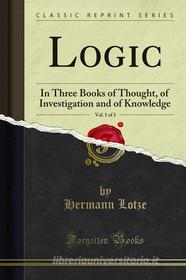
Ebook Logic
- Editore:
Forgotten Books
- EAN:
9780243622580
- Formato:
- Protezione:
- Nessuna
- Dimensione:
- 23.24 Mb
Descrizione Ebook Logic
240. True conclusions, as Aristotle has observed, can be correctly drawn from false premises. Every Laplander is a born poet, Homer was a Laplander, and therefore - by the first figure - a poet. All parasitic plants have red flowers, no rose has red flowers, therefore - by the second figure - roses are not parasitic plants. Metals do not conduct electricity, all metals are non-fusible, and hence - according to the third figure - non-fusible substances exist, which are non-conductors of electricity. Alter Laplander into Greek, plants which have red flowers into plants which have exploding seed-vessels, and write glass for metal, and in each example one premise will be true, while by inserting a new middle term in each case you may make both premises true, but in every case the conclusion follows with neither more nor less validity. Let T be a perfectly true proposition, S its subject, and P its predicate; then a middle term M may be chosen at random so long as the terms are arranged in both premises on the model of an Aristotelian figure: if this is done the conclusion T will always follow according to the figure.
We shall see why this is universally true, if we take as our middle term an abstract symbol M, instead of a concrete term: thus, all M are poets, Homer was an M; all parasitic plants are M, roses are not M; all M are non-conductors, all M are non-fusible.


